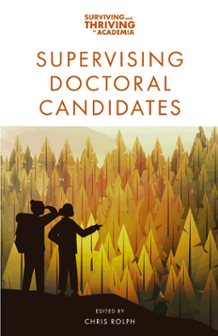
Index
Supervising Doctoral Candidates
ISBN: 978-1-83797-051-3, eISBN: 978-1-83797-048-3
Publication date: 26 March 2024
Citation
(2024), "Index", Rolph, C. (Ed.) Supervising Doctoral Candidates (Surviving and Thriving in Academia), Emerald Publishing Limited, Leeds, pp. 201-209. https://doi.org/10.1108/978-1-83797-048-320241014
Publisher
:Emerald Publishing Limited
Copyright © 2024 Chris Rolph. Published under exclusive licence by Emerald Publishing Limited
INDEX
- Prelims
- 1 Identifying the Topic at the Start of the Research Journey
- 2 Funnelling: How to Focus the Research Problem
- 3 A Needs Assessment of Doctoral Candidates
- 4 Supporting Pedagogical Relationships and Needs in Doctoral Supervision
- 5 Navigating Co-Supervision: Creating Supportive Relationships Between Peers in Supervision Teams
- 6 Working With Non-Academic Collaborators
- 7 Supervising International Students
- 8 Amplifying Candidates' Voices: Using Feedback Conversations to Develop Doctoral Identity and Writing
- 9 Joys, Challenges and Responsibilities of the Doctoral Supervision Relationship: Perspectives From Three Countries
- 10 Supporting Wider Development of Doctoral Candidates
- 11 Co-authorship With Doctoral Students
- 12 Promoting Justice for Disabled Graduate Students
- 13 The End of the Road and Start of the Journey: Defending the Thesis in a Viva
- Index